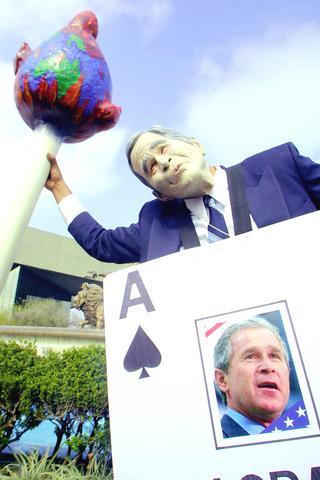A series of diplomatic rows exposing Latin American resentment of US foreign and domestic policies threatens to overshadow a major regional summit designed to promote cooperation.
The Summit of the Americas, which was to begin in the Mexican city of Monterrey yesterday, was called to discuss social development in a region with 220 million poor people.

PHOTO: AFP
But development has been conspicuously absent from the agenda in the lead-up to the two-day meeting, which has been marked by simmering tensions and open squabbles.
US president George W. Bush faces more than 30 other heads of state, many of whom oppose his policy towards Latin America.
One issue that could sour the gathering is the requirement that foreign visitors be fingerprinted and photographed at US airports. Some 27 states are exempt from the measures, but no Latin American country is among them.
Brazil is one of the most strident dissenters, and has retaliated by ordering the same measures to be applied to US visitors, causing nine-hour queues and official protests from the US. The tit-for-tat move has been hugely popular in Brazil, which is also the main thorn in US plans to negotiate a free trade deal extending from Alaska to Tierra del Fuego.
Brazilian president Luiz Inacio "Lula" da Silva is scheduled to meet Bush on the sidelines of the summit. But he is not the only Latin American president under pressure to stand up to what many view as the US' bulldozer tactics.
Last week, Argentine president Nestor Kirchner said he would win the debate with Bush in their one-on-one meeting in Monterrey "by a knockout".
His comments came days after high-ranking US officials urged Argentina to speed up the fulfilment of debt-refinancing conditions in the wake of the country's economic crisis, and criticized the failure of its foreign minister to meet dissidents on a recent trip to Cuba.
The chief minister of the Argentine cabinet, Alberto Fernandez, called the comments "impertinent."
In the absence of Fidel Castro, who was not invited because Cuba is not a member of the Organization of American States, the most vehement anti-US voice is likely to be Venezuela.
Venezuelan president Hugo Chavez last week called the US national security adviser, Condoleezza Rice, "a real illiterate" after she condemned his closeness to Castro and reluctance to call a leadership referendum.
The left-wing former paratrooper promised to speak his mind.
"The time of cowardly governments on this continent subordinate to the dictates of Washington is coming to an end," he said.
Bush should find some solace, however, in the summit's host, Mexican president Vicente Fox. Fox has welcomed the US leader's proposal to provide millions of illegal immigrants, most of them Mexicans, with temporary work visas.
But even this prize is qualified by the fact that it faces some opposition in the US Congress, and falls far short of the amnesty Fox had sought. It is more of a unilateral bone-throwing exercise than a victory for diplomacy.
Mexico's former ambassador to the UN, Alfonso Aguilar Zinser, said the plan was a sign that the US treated Latin America as its "backyard."

PRECARIOUS RELATIONS: Commentators in Saudi Arabia accuse the UAE of growing too bold, backing forces at odds with Saudi interests in various conflicts A Saudi Arabian media campaign targeting the United Arab Emirates (UAE) has deepened the Gulf’s worst row in years, stoking fears of a damaging fall-out in the financial heart of the Middle East. Fiery accusations of rights abuses and betrayal have circulated for weeks in state-run and social media after a brief conflict in Yemen, where Saudi airstrikes quelled an offensive by UAE-backed separatists. The United Arab Emirates is “investing in chaos and supporting secessionists” from Libya to Yemen and the Horn of Africa, Saudi Arabia’s al-Ekhbariya TV charged in a report this week. Such invective has been unheard of

‘TERRORIST ATTACK’: The convoy of Brigadier General Hamdi Shukri resulted in the ‘martyrdom of five of our armed forces,’ the Presidential Leadership Council said A blast targeting the convoy of a Saudi Arabian-backed armed group killed five in Yemen’s southern city of Aden and injured the commander of the government-allied unit, officials said on Wednesday. “The treacherous terrorist attack targeting the convoy of Brigadier General Hamdi Shukri, commander of the Second Giants Brigade, resulted in the martyrdom of five of our armed forces heroes and the injury of three others,” Yemen’s Saudi Arabia-backed Presidential Leadership Council said in a statement published by Yemeni news agency Saba. A security source told reporters that a car bomb on the side of the road in the Ja’awla area in

US President Donald Trump on Saturday warned Canada that if it concludes a trade deal with China, he would impose a 100 percent tariff on all goods coming over the border. Relations between the US and its northern neighbor have been rocky since Trump returned to the White House a year ago, with spats over trade and Canadian Prime Minister Mark Carney decrying a “rupture” in the US-led global order. During a visit to Beijing earlier this month, Carney hailed a “new strategic partnership” with China that resulted in a “preliminary, but landmark trade agreement” to reduce tariffs — but

SCAM CLAMPDOWN: About 130 South Korean scam suspects have been sent home since October last year, and 60 more are still waiting for repatriation Dozens of South Koreans allegedly involved in online scams in Cambodia were yesterday returned to South Korea to face investigations in what was the largest group repatriation of Korean criminal suspects from abroad. The 73 South Korean suspects allegedly scammed fellow Koreans out of 48.6 billion won (US$33 million), South Korea said. Upon arrival in South Korea’s Incheon International Airport aboard a chartered plane, the suspects — 65 men and eight women — were sent to police stations. Local TV footage showed the suspects, in handcuffs and wearing masks, being escorted by police officers and boarding buses. They were among about 260 South